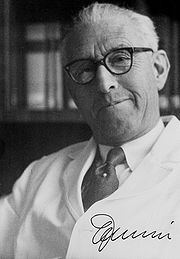
Guido Fanconi
Encyclopedia

Switzerland
Switzerland name of one of the Swiss cantons. ; ; ; or ), in its full name the Swiss Confederation , is a federal republic consisting of 26 cantons, with Bern as the seat of the federal authorities. The country is situated in Western Europe,Or Central Europe depending on the definition....
pediatrician. He was born in Poschiavo
Poschiavo
Poschiavo is a municipality in the district of Bernina in the canton of Graubünden in Switzerland.-History:Poschiavo is first mentioned in 824 as in Postclave though this comes from a later copy of the original document.. In 1140 it was mentioned as de Pusclauio. It was formerly known by the...
, Canton Grisons (Graubünden) in the Italian-speaking region of Switzerland. Fanconi is regarded as one of the founders of modern pediatrics.
He received his secondary school education in Zurich
Zürich
Zurich is the largest city in Switzerland and the capital of the canton of Zurich. It is located in central Switzerland at the northwestern tip of Lake Zurich...
, in the German-speaking part of Switzerland. In 1911, he began his medical training in Lausanne
Lausanne
Lausanne is a city in Romandy, the French-speaking part of Switzerland, and is the capital of the canton of Vaud. The seat of the district of Lausanne, the city is situated on the shores of Lake Geneva . It faces the French town of Évian-les-Bains, with the Jura mountains to its north-west...
(French Switzerland). In 1920, he entered the Kinderspital (Children's Hospital) of the University of Zurich
University of Zurich
The University of Zurich , located in the city of Zurich, is the largest university in Switzerland, with over 25,000 students. It was founded in 1833 from the existing colleges of theology, law, medicine and a new faculty of philosophy....
, where, with the exception of one year, he remained for 45 years.
Fanconi recognized the importance of biochemistry to clinical medicine. In 1929 he succeeded Emil Feer as professor of pediatrics and head of the Kinderspital. Under his direction, it became one of the most renowned children's hospitals in the world.
There are several medical conditions named after Dr. Fanconi. In 1927 he described hereditary panmyelopathy with short stature and hyperpigmentation, better known as Fanconi anemia
Fanconi anemia
Fanconi anemia is a genetic disease with an incidence of 1 per 350,000 births, with a higher frequency in Ashkenazi Jews and Afrikaners in South Africa.FA is the result of a genetic defect in a cluster of proteins responsible for DNA repair...
. In 1934 the first cases of cystic fibrosis of the pancreas were described in a thesis written under his direction. In 1941 a large epidemic of poliomyelitis occurred in Switzerland. Fanconi analyzed its epidemiology and found that the virus was not transmitted by droplet infection, as previously assumed, but rather follows a gastrointestinal pathway like typhoid fever. His understanding of pathophysiologic connections culminated in his prediction that Down syndrome
Down syndrome
Down syndrome, or Down's syndrome, trisomy 21, is a chromosomal condition caused by the presence of all or part of an extra 21st chromosome. It is named after John Langdon Down, the British physician who described the syndrome in 1866. The condition was clinically described earlier in the 19th...
was due to a chromosomal abnormality, 20 years before trisomy 21 was discovered.
In 1945 he founded a new pediatric journal, Helvetica Paediatrica Acta, which has become an internationally renowned periodical. Dr. Fanconi retired in 1965 from his chairmanship in pediatrics, but continued to practice and lecture until his death.
See also
- Fanconi anemiaFanconi anemiaFanconi anemia is a genetic disease with an incidence of 1 per 350,000 births, with a higher frequency in Ashkenazi Jews and Afrikaners in South Africa.FA is the result of a genetic defect in a cluster of proteins responsible for DNA repair...
- Prader-Willi syndromePrader-Willi syndromePrader–Willi syndrome is a rare genetic disorder in which seven genes on chromosome 15 are deleted or unexpressed on the paternal chromosome...
, discovered by a team of physicians including Fanconi. - Fanconi syndromeFanconi syndromeFalconi syndrome is a disease of the proximal renal tubules of the kidney in which glucose, amino acids, uric acid, phosphate and bicarbonate are passed into the urine, instead of being reabsorbed. Fanconi syndrome affects the proximal tubule, which is the first part of the tubule to process fluid...
, likely a misnomer, as this entity was not described by Fanconi.
External links
- Who Named It? - Guido Fanconi
- Biography of Guido Fanconi by Stephan Lobitz (Berlin, Germany) and Eunike Velleuer (Düsseldorf, Germany), published in Nature Reviews CancerNature Reviews CancerNature Reviews Cancer is a monthly review journal covering the field of oncology....
(Nov. 2006)

